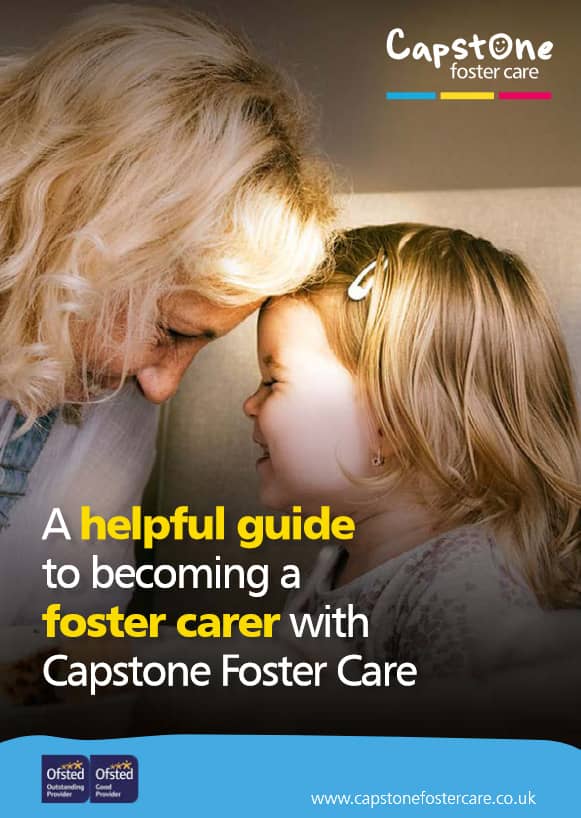


Fostering a disabled child
The role of an independent fostering agency
How to choose a foster care agency
Can I choose who I foster?
What are the benefits of fostering with an independent fostering agency?
What happens when a child is taken into care?
Fostering process: what happens on an initial home visit?
Fostering with local authority vs independent agency
A complete guide to becoming a foster carer
How Are Children in Foster Care Matched with Carers?
Foster Care Budgeting Tips
Becoming A Foster Carer
What is a Care Leaver?
What is a Foster Carer?
Fostering Regulations
How long does it take to become a Foster Carer?
What are the Foster Care requirements?
Changing IFA - Transferring to Capstone
8 reasons why a child may be taken into care
Fostering as a Career
Can you foster if you smoke or vape?
A guide to fostering assessments
LGBTQ+ Fostering
Equality, Inclusion & Anti-discriminatory Practice in Foster Care
What can disqualify you from foster care?
Can you foster if you’re on benefits?
Top transferable job skills to become a foster carer
Fostering as a same sex couple
Fostering while renting
Can you foster if you have mental health issues?
Is there an age limit for fostering in the UK?
Do foster carers get a pension?
How to foster a child: A step by step guide
How do DBS Checks Work?
Can I foster if...?
Mythbusting the top 10 Foster Care Myths
Can I foster if I am disabled?
LGBT Fostering Mythbusting
Can I foster if I have pets?
Can I Foster A Child?
Can I Foster and Work?
Can you Foster with a Criminal Record
Can Single People Foster?
LGBT Family and Foster Care
Fostering across Cultures
Muslim Fostering
Christian Foster Care
Sikh Fostering
Empty Nest Syndrome and Foster Care
Can I Foster?
What is the difference between residential care and foster care?
Fostering Babies and Young Children
What is Kinship Care?
Fostering Babies - Myths
Focusing on Parent & Child Fostering
Fostering Siblings
Fostering Teenagers
Fostering Teenagers - Breaking down the Myths
Fostering Unaccompanied and Asylum Seeking Children
Mother and Baby Foster Placements
Private Fostering
How does therapeutic fostering work?
Young Children Fostering Placements
Difference between short and long-term fostering
Types of self-harm
A Guide to the Foster Care Handbook
Reunification and Birth Parents: A Guide for Foster Carers
What is an EHC Plan? A Guide for Foster Carers
How to prepare a child for becoming a care leaver
Children who foster: impact of fostering on birth children
Fostering LGBTQ+ Youth
How to prepare your home for a foster child
How to help a lonely child: A Guide for Foster Carers
What are the National Minimum Standards for Fostering Services?
10 tips for foster children's education
How to prepare your foster child for secondary school
Tips for coping when foster placements end
Tips for foster parents during Coronavirus
What happens if foster parents get divorced?
5 ways to manage Mother's Day with foster children
Tips for managing foster children's bedtime routines
How to handle foster child bullying
Fostering allowances and the gender pay gap
What discounts can foster carers get?
How to adopt from Foster Care
5 ways to manage Father's Day for children in foster care
8 most common fostering challenges
FosterTalk Membership with Capstone Foster Care
Supporting foster children's contact with birth families
A guide to independent fostering
Keeping Children Safe Online: A Guide For Foster Carers
Movies About Foster Care
Play-based learning strategies for foster carers
A Guide to the Staying Put Program
How to deal with empty nest syndrome
How to recognise signs of depression in foster children
Can you take a foster child on holiday?
Tips and advice on fostering with a disability
10 tips on connecting with your Foster Child
Fostering vs Adoption - What's the difference?
How Fostering can change a future
How to adopt from Foster Care
How to encourage children to read in Foster Care
How to prepare a Foster Child's bedroom
Reading and Storytelling with Babies and Young Children
Supporting Children's Learning
The 20 most recommended books Foster Carers and young people should read
Things you can do when your children leave home
The impact of early childhood traumas on adolescence and adulthood
Anxious Disorders in Foster Children
What is sexual abuse and sexual violence
Foster Child behaviour management strategies
Foster Parent Advice: What to expect in your first year of fostering
Capstone's twelve tips at Christmas
10 celebrities who grew up in Foster Care
Could Millenials be the solution to the Foster Care crisis?
Do you work in Emergency Services?
Form F Assessor and Assessment Training
Foster Care Fortnight
Improving Children's Welfare - Celebrating Universal Children's Day
New Year - New Career - Become a Foster Carer
Young People Charities
Here at Capstone Foster Care, we offer tailored therapeutic assessments and interventions for children and young people in foster care at the point of need as part of our therapeutic foster care service. The service is designed to help children and young people overcome trauma and developmental challenges through unique multidisciplinary support.
Our MATTs service is a multi-disciplinary assessment treatment and therapy service. It integrates clinical and therapeutic expertise to support children with complex needs by balancing comprehensive assessments and therapy with carer support for a holistic approach.
There’s no one-size-fits-all approach to MATTs, and the therapies offered will be tailored specifically to your foster child. This could include methods such as;
During a MATTs assessment, the child is observed in different environments, such as at home and at school. We will also speak to key individuals involved in your foster child’s care, such as their teachers, previous caregivers, family members and social workers, to help inform the care plan.
The MATTs service is centred around the child’s needs, ultimately ensuring that the child’s voice is heard and that their preferences are considered. For example, this might mean that therapies and interventions are held where the child is most comfortable.
MATTs not only support children who have mental health conditions related to the trauma that they’ve experienced in their past but can also help children who suffer from mental health conditions like anxiety and depression as well as children and young people with neurodevelopmental conditions like autism and ADHD.
Our MATTs service includes regular clinical reviews and is adaptable to your foster child’s requirements, meaning that the service evolves with your foster child’s growing needs.
Progress is measured in a tangible way, with monthly outcome assessments. We also follow standard measures such as the TAYC tool (thinking about your child). Progress is measured against 44 nationally agreed outcomes, and assessments are recorded and shared with your foster child’s social worker.
As a multi-disciplinary service, the therapeutic interventions are delivered by a number of different professionals, including clinical psychologists and occupational therapists with experience in trauma and attachment.
Children can be referred to the MATTs service by their foster carers or other professionals involved in their care. It complements other services like CAMHS by offering timely and specialised care working together with external providers.
Here at Capstone Foster Care, we ensure our foster carers are supported from day one. We provide reflective sessions, weekly telephone support and in-person consultations to ensure you feel confident in understanding and responding to your foster child’s behaviours and emotional needs.
We also provide training in the form of therapeutic pre-panel training and ongoing support in a number of areas, including;
Want to find out more about therapeutic foster care? Learn more today. Or contact a member of our friendly team today!
If you’ve got any questions or would like to find out more about fostering with Capstone, fill out the form below.
An experienced fostering advisor from your local area will then be in touch.

Start the conversation today. Our team of friendly advisors are on hand to answer any foster care questions you may have. We can offer you honest and practical advice that can help you decide if becoming a foster carer is the right path for you.


